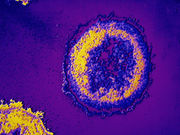Inhibition with emetine occurs after virus entry but before DNA replication
MONDAY, July 11, 2016 (HealthDay News) — Emetine may represent a therapeutic option for human cytomegalovirus (HCMV) infection, according to a study published in the June issue of PLOS Pathogens.
Rupkatha Mukhopadhyay, Ph.D., from the Johns Hopkins University School of Medicine in Baltimore, and colleagues screened a library of pharmacologically active compounds and identified emetine as an HCMV inhibitor.
The researchers confirmed the anti-HCMV activities of emetine in human foreskin fibroblasts. Inhibition with emetine occurred after virus entry but before DNA replication, correlating with a reduction in expression of viral proteins. When emetine was combined with ganciclovir, synergistic virus inhibition was achieved. In a mouse CMV (MCMV) model, emetine was well tolerated, with a long half-life, preferential distribution to tissues versus plasma, and the ability to suppress MCMV effectively. HCMV inhibition by emetine was dependent on ribosomal processing S14 (RPS14) binding to MDM2, which resulted in disruption of HCMV-induced MDM2-p53 and MDM2-IE2 interactions. During infection, emetine induced RPS14 translocation into the nucleus, regardless of cell density. In infected-only or non-infected emetine-treated cells, RPS14 did not translocate into the nucleus and could not interact with MDM2. Similar replication of HCMV was seen in RPS14 knockdown or control cells, but in knockdown cells, emetine did not inhibit virus replication. In infected RPS14 knockdown cells, the interaction of MDM2-p53 was maintained, despite emetine treatment.
“Emetine may represent a promising candidate for HCMV therapy alone or in combination with ganciclovir through a novel host-dependent mechanism,” the authors write.
Full Text
Copyright © 2016 HealthDay. All rights reserved.








